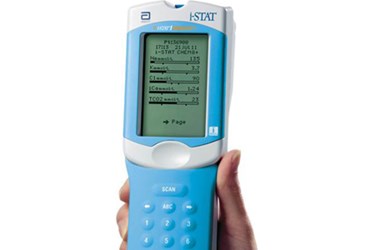DOD Taps Abbott For Real-Time Concussion Testing
By Chuck Seegert, Ph.D.

Diagnosing traumatic brain injury (TBI) on the battlefield is a pressing need for the U.S. Department of Defense (DOD), and Abbott Laboratories has been tasked with finding the solution.
In a recently announced collaboration, the DOD and Abbott will be kicking off a multi-phased project for a new set of portable tests that evaluate concussions, or mild-TBIs. More than 300,000 service members have suffered from TBIs since 2000, mostly due to training accidents and non-combat assignments reports the Chicago Tribune.
“The quick and accurate diagnosis of a concussion is critical so that soldiers who are affected –– whether on the battlefield or not –– can be removed from duty to recover and to prevent further injury,” said Colonel Dallas C. Hack, M.D., brain health coordinator with the U.S. Army Medical Research and Materiel Command, in a recent press release. “The Department of Defense collaboration with Abbott represents a major initiative to help improve efforts to understand this complex injury and care for wounded warriors suffering from this condition.”
The test regimen will be added on to Abbott’s existing i-STAT device, a point-of-care system that is already in use in some military applications. According to Abbott, this portable handheld device weighs about 18 ounces and requires little sample preparation or calibration. Currently, more than 50,000 i-STAT devices are in use worldwide, boasting features like barcode entry of patient information and a lockout mechanism to prevent unauthorized access.
The i-STAT test platform generates lab quality results that can be uploaded to patient records automatically. The test device utilizes cartridges specialized for each test. Currently, these cartridges can measure a variety of biological markers including lactate, coagulation, blood gases, and more, according to Abbott’s website. The DOD suite of tests would likely add on to this growing list of capabilities, and the i-STAT promises to add benefits due to its relative maturity as a technology.
Rapid bedside diagnostics is an area that is becoming increasingly prominent in the healthcare field, as the needs to reduce costs and increase speed of delivery become more important. Tests for Ebola are under development for scenarios like those recently seen in West Africa, along with point-of-care tests for areas in developing countries that have little lab capabilities for patient treatment.
Image Credit: Abbott
